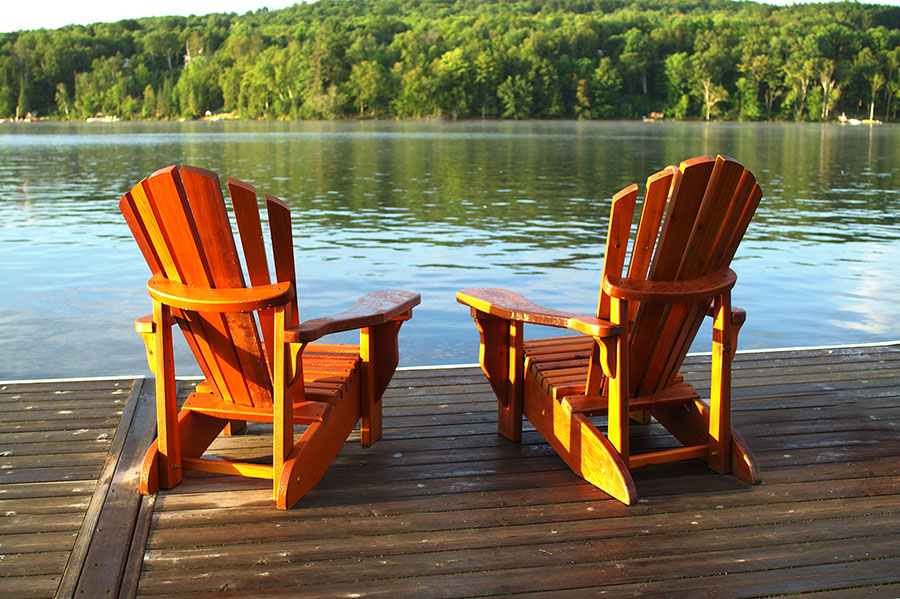Back in 2000, we decided it might be timely to enter the recreational property market. Both my wife and I grew up enjoying cottage life in the Laurentians north of Montreal. Ironically, our families owned properties on two lakes that were actually connected to one another. Even so, we never bumped into each another as youngsters enjoying the fun and freedom of cottage life.
An explosion of interest in cottage ownership occurred during the COVID pandemic. 22 years ago, we were able to line up 17 properties to view in the month of August alone – all within a 90-minute radius of Ottawa. Today, you would be lucky to find 2 or three available properties all summer. In addition, prices have ballooned beyond belief.
As this series on cottage investment examines lessons learned over the past quarter of a century, let us begin with 10 critical questions that should be asked if one is considering ownership.
- Do I have to worry about land claims? Today, this is something everyone should take into consideration. Our purchase put us just outside the Pikwakanagan Algonquin First Nations near Algonquin Park. That said, we asked the question and discovered the opposite side of our lake does indeed have a long-debated land claim. Fortunately, our side does not. With this in mind, you should also have your lawyer look into special treed areas like Federal Crown lands or those that may be tagged by logging companies.
- Are the water levels stable and is there a risk of flooding? Is the lake regulated by a water system? Even so, this doesn’t guarantee you’ll avoid flooding: our lake has been hit twice and hard. Is the cottage you’ve fallen in love with just above the water level or is it raised? Does the property flow away or have a berm?
- What is the source of water for the cottage? Is it from the lake, municipality or is it well-driven? A new well will cost a few extra thousand dollars, with the additional cost of hooking it up to the cottage of your dreams. Further, if the water comes from a well, you must also consider the costs of water testing (for nitrates, lead or even sulphur) and potential remedial actions to make the water 100% pure. Our experience of water testing at the cottage led to a filtration and softener system for another few thousand dollars.
- How is the lake’s water quality? Not only is it important to consider water potability, it is vital to know about what you, your family and perhaps pets are about to swim in. Consider testing
- Who owns the waterfront? Townships and municipalities often own the first 66ft of the frontage. While a beautiful waterfront is often the #1 reason for buying, you may discover someone else has a stake on what you want to buy. It’s definitely worth asking about, as the existing owner may already have bought it. We did buy back our waterfront, and it is much less expensive if you can convince the neighbours to join you. The cost of a lawyer and land surveyor split by all the property owners was well worth the effort: it brought the cost down to approximately $3000, and will become a valuable selling feature in the future.
- Who maintains the property’s access road? Many roads are private and are maintained by a local owners’ association. This is normal; however, you need to know if it is maintained 12 months of the year. Prices will vary. Ours started at $50 with a full accounting of materials like gravel and the use of a grader to level and remove potholes. Today we pay $200 per year.
- Is the owners’ association efficient, effective and community-minded? What is the culture or temperament of the group? Keep in mind, these organizations are volunteer run and many members are bound to be year-round residents. The expectations of seasonal owners are always different from permanent residents. Some can be very strict about ski-doo usage, ATV’s, powerboats and noise.
- How do we dispose of waste? How well has the septic system been maintained? Are there records? Look closely at the drainage bed. Is it wet? Is it lush with vegetation? If so, it is a bad sign as the waste is not being properly drained. A septic system will likely not need to be replaced within 20-years with average maintenance; excellent maintenance will prolong the need for replacement. If you have just an outhouse, you may not be allowed to replace it and face the expense of upgrading to a composting toilet or putting in a septic system at a cost of at least $30,000. You will also want to know where the local dump is, what the rules are regarding recycling and when they are open to receive waste.
- What are the 911 services like? This one is critical for pricing on recreational insurance costs. What is the distance between the cottage and fire services? The further away, the higher your insurance costs will be. Response time is the key variable. Where are the closest medical services? Peace of mind is paramount.
- Finally, how good is your insurance and how generous is the township/municipality on building permits? After we bought what was a simple cottage built in 1958, we decided to add a basement while renovating and upgrading the upper level. No sooner had this been completed, than a severe microburst hit the area the following year, snapping a huge tree that crushed our newly designed cottage. This forced a complete rebuild. Our township was top notch as was our insurance company. Two lessons were learned. First, as you’re most likely not going to be living at your cottage year-round, purchasing a “top-level” insurance package is well worth it. In the end, the fallen tree was a blessing in disguise and we were able to bring our cottage to the next level as everything was covered. The second lesson was the immense value of asking these questions before we bought the property – and we’ve never once regretted our decision.
This short guide (based on personal experience) is intended help individuals, families and investors see the forest for the trees on cottage ownership. It has been quite the voyage, creating great memories to share and laugh about as the years go by. It takes work, a strong love of the land and meticulous planning. It is my hope that with sound advice and good information at your fingertips, you will be able to make wise choices that will enhance your life and that of your family for years to come.
This is part one of a series on Investing in Recreational Property.
Enjoy






